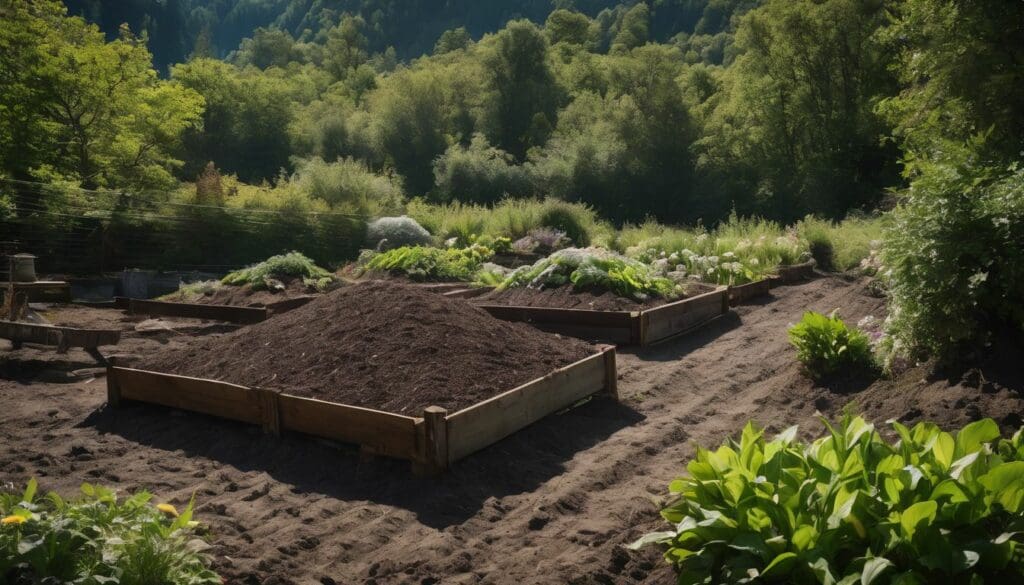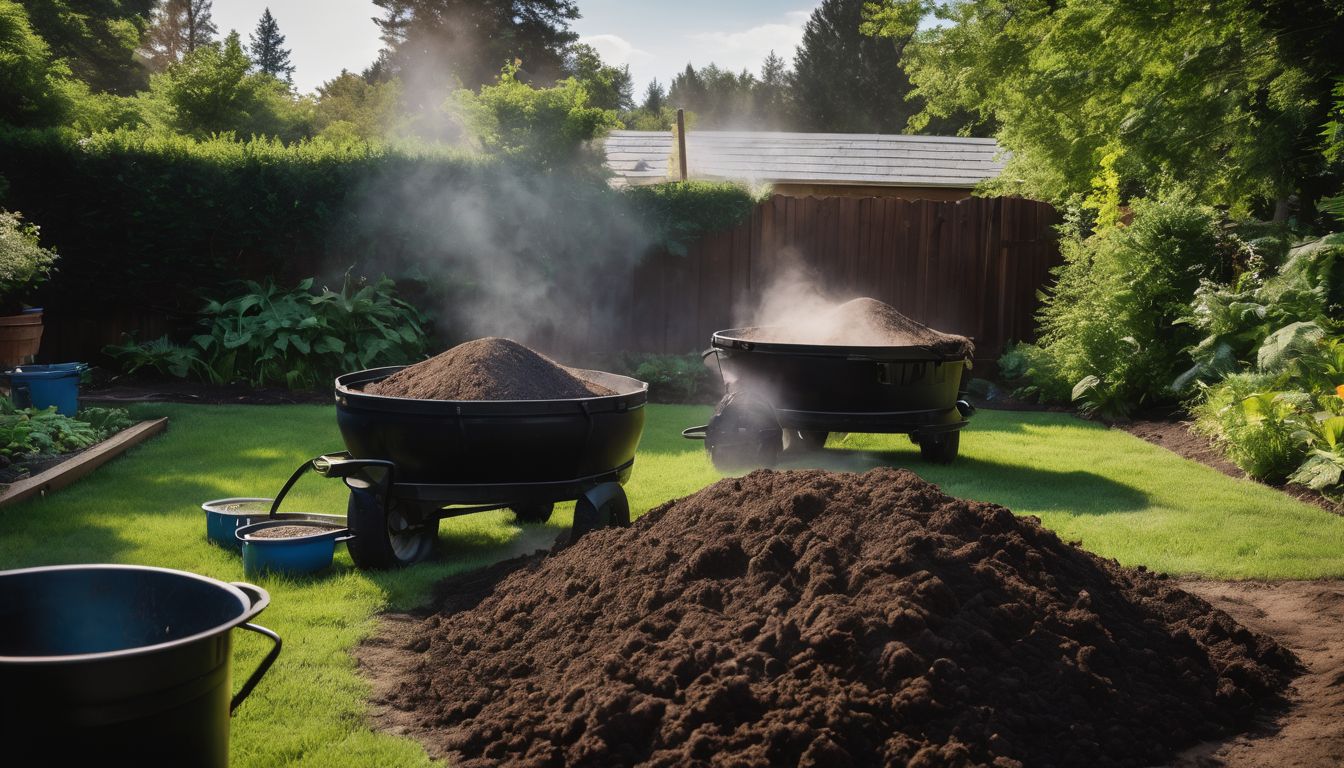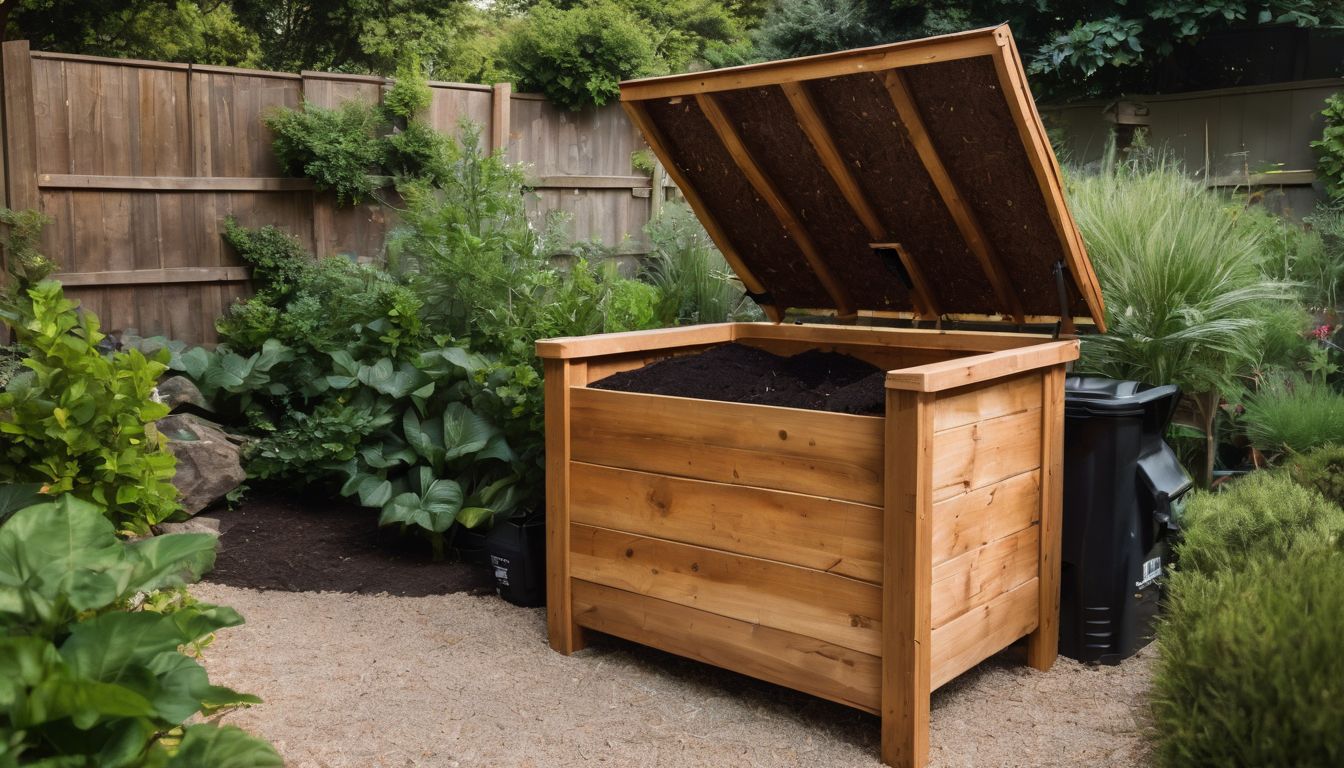Every week, our bins fill up and we send off waste to crowd ever-growing landfills. Did you know that about half of this rubbish is organic material that could be renewed through composting? This article will guide you through the wonders of composting, showing you how it slashes landfill mass and nurtures the earth.
Dive in to turn your scraps into treasure!
Key Takeaways
- Composting is a natural process that transforms organic waste into nutrient – rich soil, playing a significant role in reducing the amount of rubbish sent to landfills.
- By diverting food scraps and garden trimmings from landfill sites, composting decreases methane emissions – a potent greenhouse gas – thus combating climate change.
- Landfills cause pollution and soil contamination; composting reduces these issues by keeping organic materials out of landfills where they would otherwise decompose anaerobically.
- Implementing both at – home and commercial composting can lead to economic benefits, such as reduced waste disposal costs and savings on fertilisers for farmers and gardeners.
- Composting improves soil quality through the return of vital nutrients back into the earth. This enhanced soil can retain water better, support plant growth, and reduce dependence on chemical fertilisers.
What is Composting?
Composting is a natural process that breaks down organic waste into nutrient-rich soil. It involves layering kitchen scraps, like fruit and vegetable peelings, with garden clippings and other biodegradables to create the perfect environment for decomposition.
Microorganisms, such as bacteria and fungi, along with worms and insects, work tirelessly to transform this waste into compost. This rich substance benefits the earth by enriching soil quality, making it a powerful tool in sustainable living.
By engaging in composting practices at home or within the community, environmentally conscious individuals contribute significantly to reducing landfill waste. This act of upcycling not only deters harmful emissions from organic materials rotting away in landfills but also returns valuable nutrients back to our soils.
Compost can be used in gardens or agricultural fields, closing the loop on food production by nurturing the next cycle of plants that will grace our tables.
The Negative Impact of Landfills
Landfills have a negative impact on the environment, contributing to pollution, methane emissions, and soil contamination. These factors can have serious consequences for human health and the planet as a whole.
Pollution
Air pollution is a significant concern associated with landfills. When organic waste decomposes in landfills, it releases harmful pollutants such as methane and carbon dioxide into the atmosphere.
These emissions contribute to climate change and can also have a direct impact on air quality, posing health risks to nearby communities. Soil contamination is another issue linked to landfill sites; chemicals from decomposing waste can leach into the soil, affecting water sources and potentially harming ecosystems.
By diverting organic waste from landfills through composting, we can mitigate these pollution concerns. Composting helps reduce greenhouse gas emissions by preventing organic matter from breaking down anaerobically in landfills and instead turning it into nutrient-rich compost that benefits soil health.
Methane emissions
Composting significantly reduces methane emissions. By diverting food and organic waste from landfills, where it would decompose anaerobically, composting lowers the production of methane gas.
This potent greenhouse gas contributes to climate change and accelerates global warming. Therefore, embracing composting as a waste management solution plays a vital role in reducing harmful methane emissions and mitigating the impacts of climate change.
Moving on to “Soil contamination reduction,” let’s explore how composting positively impacts soil health and environmental sustainability.
Soil contamination
Soil contamination occurs when harmful substances from landfills leach into the soil, endangering plant and animal life. Harmful chemicals from landfill waste can seep into groundwater, affecting drinking water quality.
Composting helps reduce soil contamination by diverting organic waste away from landfills where it could contaminate surrounding soil and water sources. Instead, composting transforms organic waste into nutrient-rich compost that enriches the soil, promoting healthier ecosystems and reducing the risk of contamination.
Composting plays a crucial role in preventing soil contamination, safeguarding natural habitats and preserving clean water sources for future generations. By diverting organic waste from landfills, we can significantly decrease the risk of harmful substances permeating our precious soils and impacting wildlife and human health.
How Composting Can Reduce Landfill Waste
Composting reduces landfill waste by diverting organic waste, transforming it into nutrient-rich compost, and reducing greenhouse gas emissions. To learn more about the impact of composting on reducing landfill waste, keep reading!
Diverting organic waste from landfills
Organic waste diversion is crucial for reducing the environmental impact of landfills. By diverting organic waste from landfills, we can significantly decrease methane emissions and soil contamination, while also reducing greenhouse gas emissions.
This process directly contributes to waste reduction and has a positive impact on carbon emissions reduction.
Diverting organic waste to composting facilities rather than sending it to landfills transforms the waste into nutrient-rich compost. Composting not only reduces air pollution but also improves soil quality and helps combat climate change by returning essential nutrients to the earth instead of releasing harmful gases into the atmosphere.
Taking action towards diverting organic waste from landfills through composting plays a vital role in supporting conservation efforts and promoting sustainability for future generations.
Transforming waste into nutrient-rich compost
Composting transforms organic waste into nutrient-rich compost, offering a sustainable solution to reducing landfill waste. This process converts food scraps and garden trimmings into valuable soil amendment, enriching the earth’s nutrients and promoting healthier plant growth.
By diverting organic materials from landfills and creating compost instead, we reduce methane emissions and the buildup of greenhouse gases. The result is not only a reduction in landfill waste but also an increase in beneficial organic matter returning to the soil.
Moreover, nutrient-rich compost helps improve soil quality and reduces the need for synthetic fertilisers. Composting plays a crucial role in recycling organic waste and mitigating climate change while contributing positively to our environment.
Reducing greenhouse gas emissions
Composting reduces greenhouse gas emissions by preventing organic waste from decomposing in landfills, where it would release methane, a potent greenhouse gas. Instead, through the composting process, organic materials break down aerobically, significantly reducing the emission of methane and carbon dioxide into the atmosphere.
This helps mitigate climate change while promoting sustainable waste management practices that benefit the environment.
Furthermore, by diverting organic waste from landfills and transforming it into nutrient-rich compost through aerobic decomposition, composting plays a vital role in reducing greenhouse gas emissions.
Additional Benefits of Composting
Composting not only helps reduce landfill waste but also improves soil quality, combats climate change and has potential economic benefits.
Improving soil quality
Improving soil quality is a crucial benefit of composting. Composting enriches the soil by returning essential nutrients, such as nitrogen, phosphorus, and potassium, creating a fertile environment for plant growth.
This process also enhances soil structure, promoting water retention and reducing erosion.
Composting enhances microbial activity in the soil, fostering healthier and more diverse ecosystems underground. Moreover, it aids in suppressing diseases that can affect plants while improving overall soil health.
Combating climate change
Composting plays a crucial role in combating climate change by reducing greenhouse gas emissions. When organic waste decomposes in landfills, it produces methane, a potent greenhouse gas.
By diverting organic waste from landfills and composting it instead, we can significantly decrease methane emissions, contributing to the reduction of air pollution and the mitigation of climate change impact.
Composting also enriches soil quality and promotes carbon sequestration, further aiding in the fight against climate change.
Potential economic benefits
Composting can provide potential economic benefits by reducing the costs associated with waste disposal. It decreases the amount of organic waste sent to landfills, resulting in lower landfill operational costs and extending the lifespan of existing landfill sites.
Additionally, businesses and farms can save on fertiliser expenses by using nutrient-rich compost produced from their own organic waste, contributing to cost savings and promoting a more sustainable and circular economy.
Incorporating composting into waste management practices at both individual and community levels can lead to long-term economic advantages. This includes creating green jobs through composting activities and reducing the need for expensive pollution clean-up measures due to decreased soil contamination.
Taking Action: How to Start Composting
Want to start composting? Learn about at-home and commercial composting options, understand the considerations for successful composting, and discover the co-benefits of reducing organic waste.
At-home vs. commercial composting
At-home composting and commercial composting both play a vital role in reducing landfill waste. At-home composting allows individuals to manage their organic waste on a smaller scale, making use of kitchen scraps and yard waste.
On the other hand, commercial composting is more suitable for larger quantities of organic waste from businesses and communities. Both methods contribute to reducing greenhouse gas emissions by diverting organic waste from landfills.
Commercial composting facilities have the capacity to process a significant volume of organic material efficiently, contributing to large-scale nutrient return to the soil. At home, individuals can also make a meaningful impact by transforming their food and yard waste into valuable compost that enriches soil quality.
Considerations for successful composting
- Location: Place the compost bin in a convenient, shaded area with good drainage to prevent waterlogging and promote airflow.
- Balance of materials: Add a mix of green materials (such as food scraps and grass clippings) and brown materials (like leaves and paper) for optimal decomposition.
- Size of particles: Chop or shred large organic waste into smaller pieces to speed up the composting process.
- Turning frequency: Regularly turn the compost to aerate it and distribute moisture evenly, promoting efficient decomposition.
- Monitoring moisture levels: Maintain a damp, but not soggy, consistency within the compost to support microbial activity.
- Temperature control: Keep the compost pile warm by insulating it during colder months or turning it more frequently to generate heat through decomposition.
- Odour management: Cover food scraps with an adequate layer of brown materials to reduce smells and deter pests.
Co-benefits of composting
Composting offers co-benefits that extend beyond waste reduction. It enriches soil, promoting healthier plant growth and reducing the need for chemical fertilisers. Additionally, composting can aid in climate change mitigation by capturing carbon dioxide from the atmosphere and enhancing soil’s ability to retain water.
These co-benefits make composting a practical and eco-friendly solution for individuals looking to reduce their environmental impact.
By embracing composting, individuals can play a crucial role in preserving the environment while contributing to sustainable practices.
Conclusion
In conclusion, composting plays a vital role in reducing landfill waste. It diverts organic waste, decreases greenhouse gas emissions and enriches soil. By taking action through composting, individuals can actively contribute to a healthier environment.
Making the choice to compost can have a lasting impact on reducing the negative effects of landfills.
FAQs
1. How does composting reduce landfill waste?
Composting turns food waste and other organic materials into valuable soil, helping to divert these wastes from landfills where they would take up space and contribute to pollution.
2. Can composting help with greenhouse gas emissions?
Yes, by composting organic waste instead of sending it to a landfill, you can reduce methane emissions, which are a significant contributor to greenhouse gas emissions.
3. Does composting have any benefits for the soil?
Absolutely! Composting enhances soil quality by adding nutrients and reducing the risk of soil contamination through the diversion of organic waste from landfills.
4. Will making compost at home make air pollution better or worse?
Making your own compost actually helps in reducing air pollution because it cuts down on the methane that is released when organic material breaks down in landfills without enough oxygen.





